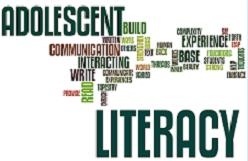What is Adolescent Literacy?

“Reading is the key. Without it, the instruction for playing Monopoly, the recipe for Grandma’s lasagna, The Cat in the Hat, the directions to the job interview, the Psalms, the lyrics to Stairway to Heaven – all these and a lifetime of other mysteries large and small may never be known.” (Kansas City Start newspaper)
The quote above reminds us that literacy skills in the 21st century are more essential than ever for success in education, work, citizenship, and our personal lives. However, far too many older students and adults do not have the necessary reading and writing skills to succeed in postsecondary education or the ever-increasing number of jobs that require literacy skills.
During the 1990’s and through 2008, significant emphasis was placed on the use of research to determine how children learn to read and why some students struggle with reading. Early literacy achievement, however, is not necessarily a guarantee that literacy skills will continue to grow as students move beyond grade 3. Scores at the secondary level, where there has been relatively little investment, have remained flat since the 1970’s (Heller & Greenleaf, 2007). A growing body of work is developing about how students beyond grade 3 learn to increase their reading and writing skills, why some struggle, and what effective instruction looks like.
The term adolescent literacy can be misleading – adolescent literacy is not limited to teenagers! This label is used to describe literacy skills for students in grades 4-12. The axiom that through grade 3, students are learning to read, but beginning in grade 4 they shift to reading to learn (Chall, 1983), sums up why grade 4 is the logical place to make the jump from early literacy to adolescent literacy. The publication of the widely cited reports Reading Next (Biancarosa & Snow) and Writing Next (Graham & Perrin, 2007) helped solidify this definition of adolescent literacy.
Adolescent literacy encompasses the skills that must be taught to all students so they can meet increasingly challenging reading and writing demands as they move through the upper grades (i.e., comprehension, vocabulary, writing skills), as well as what needs to be done for those students who fall behind who may need intervention instruction in foundational literacy skills (i.e., decoding and fluency).
Major Adolescent Literacy Reports
Here is a list of research reports that summarize adolescent research and provide suggestions for effective solutions to address the literacy needs of students in grades 4-12:
Additional Resources
A chapter I authored focusing on adolescent literacy was published in 2011 in the book Multisensory Teaching of Basic Language Skills, 3rd Edition (Judith Birsh, Ed). You can access the full chapter here.
You can also refer to a blog post I wrote in 2014 summarizing Beth Morrow’s article Seven Considerations When Developing Adolescent Literacy.
AdLit.Org – This is a national website that housed a very large collection of articles, research reviews, video clips, a blog, and other resources devoted to adolescent literacy.

 Joan Sedita is the founder of Keys to Literacy and author of the Keys to Literacy professional development programs. She is an experienced educator, nationally recognized speaker and teacher trainer. She has worked for over 35 years in the literacy education field and has presented to thousands of teachers and related professionals at schools, colleges, clinics, and professional conferences.
Joan Sedita is the founder of Keys to Literacy and author of the Keys to Literacy professional development programs. She is an experienced educator, nationally recognized speaker and teacher trainer. She has worked for over 35 years in the literacy education field and has presented to thousands of teachers and related professionals at schools, colleges, clinics, and professional conferences.
Thank you for this invaluable resource!!!💕